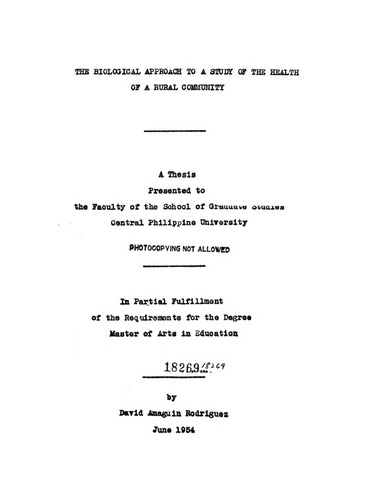The biological approach to a study of the health of a rural community
| dc.contributor.author | Rodriguez, David Amaguin | |
| dc.date.accessioned | 2021-12-03T07:02:06Z | |
| dc.date.available | 2021-12-03T07:02:06Z | |
| dc.date.issued | 1954 | |
| dc.identifier.citation | Rodriguez, D. A. (1954). The biological approach to a study of the health of a rural community (Unpublished Master’s thesis). Central Philippine University, Jaro, Iloilo City. | en_US |
| dc.identifier.uri | https://hdl.handle.net/20.500.12852/1755 | |
| dc.description | Introduction and statement of the problem | en_US |
| dc.description.abstract | Biology is the science of life, but many lives are being lost due to the ravages of such diseases as tuberculosis, beriberi, acute bronchitis, bronchipneumonia, diarrhea enteritis, influenza, dysentery and whooping cough. Advancement in science has made it possible to cure and prevent these diseases, but something hinders the progress and the success of medical health, This hindrance is the "quack mentality" which is widespread among the people in the rural areas. It appears that the best means of counteracting this mentality is the rigid application of the biological laws and the proper dissemination of health education and sanitary conditions among the people of the rural community. Biology is valuable as an informational basis of morals and civics as it is for health. The leaders in health and health education within a few years will come largely from the high school students of today. Knowledge brings light. The student must know the past, the present and the future of health to awaken the challenge within him concerning his personal health, the health of the family and of the community. There can be no doubt that a knowledge of the essentials of health and of the means of preventing or controlling communicable diseases, and familiarity with the community resources is a protection of the individual. As the level of health education rises in a community, the morbidity and mortality rates may be expected to fall. It has been demonstrated by the scientists that when the cause and the mode of transmission are known, a communicable disease can be practically wiped out in a community. The problem. It was the purpose of this study (1) to discover the principal factors that affect the health of a rural community; (2) to reveal the infectious agents of diseases and to suggest ways to help reduce, if not entirely eradicate, the incidence of the great numbers of preventable diseases; (3) to point out the common necessary food elements found in the community; (4) to suggest ways of enriching the secondary school curriculum; and (5) to make changes in the course offerings for the prospective teachers of biology. | en_US |
| dc.format.extent | 134 leaves | en_US |
| dc.language.iso | en | en_US |
| dc.subject.ddc | GSL Theses 378.242 R61 | en_US |
| dc.subject.lcsh | Medicine, Preventive | en_US |
| dc.subject.lcsh | Rural conditions | en_US |
| dc.subject.lcsh | Public health | en_US |
| dc.subject.lcsh | Biology--Study and teaching (Secondary) | en_US |
| dc.subject.lcsh | Public health--Evaluation | en_US |
| dc.title | The biological approach to a study of the health of a rural community | en_US |
| dc.type | Thesis | en_US |
| dc.description.bibliographicalreferences | Includes bibliographical references | en_US |
| dc.contributor.chair | Nelson, Linnea A. | |
| dc.contributor.committeemember | Larsen, Almus O. | |
| dc.contributor.committeemember | Catedral, Alfredo P. | |
| dc.contributor.committeemember | Drilon, Rex D. | |
| dc.contributor.department | School of Graduate Studies | en_US |
| dc.description.degree | Master of Arts in Education | en_US |


